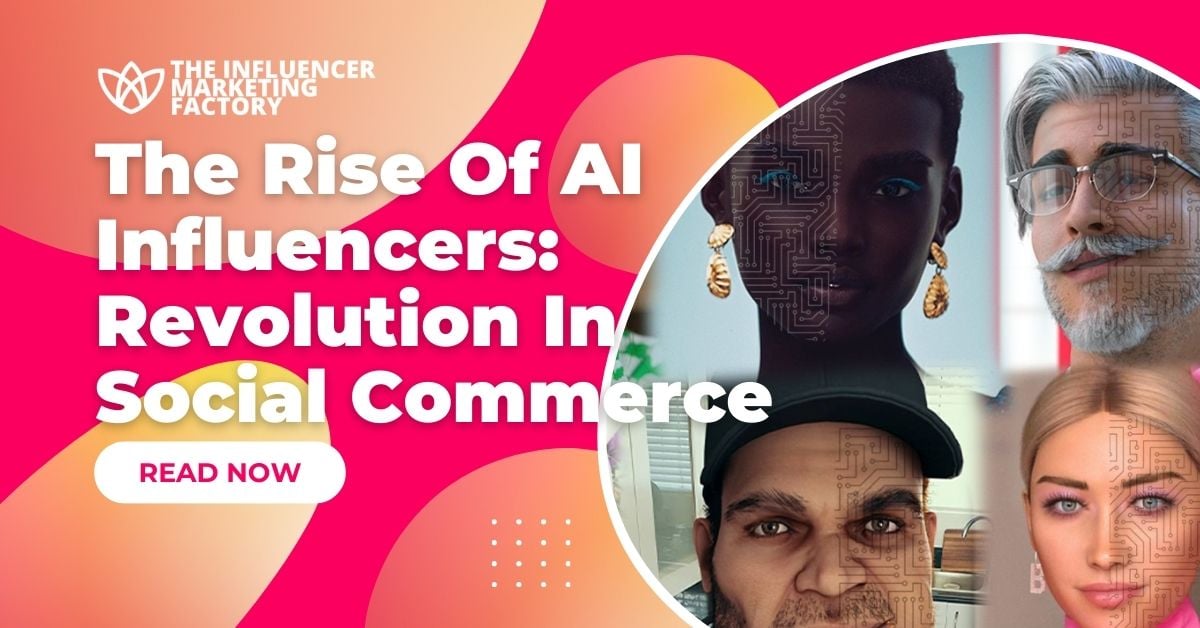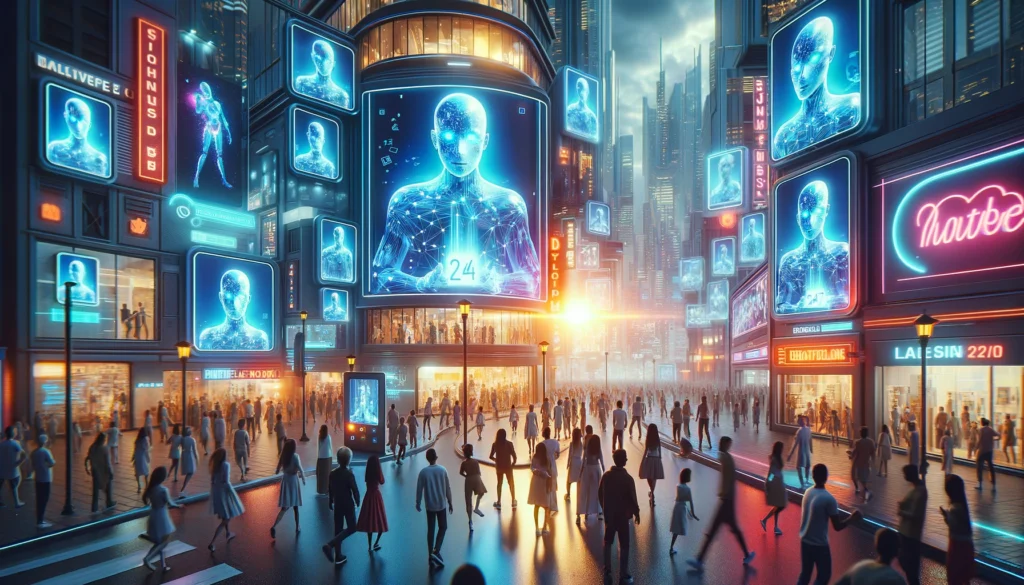
19 Mar The Rise of AI Influencers: Revolution in Social Commerce
Summary
Imagine this scenario: you’re scrolling through your Instagram feed, looking for inspiration for a new look or gift ideas for your best mate. Suddenly, amidst the flow of photos and videos, you notice a well-dressed girl or a stylish guy sharing their latest experience with a product or recommending beauty items, whatever. You follow their account, rely on their advice, and get inspired by their lifestyle.
And then, one day, you find out that your favorite influencer is not a real person. He or she is created by computer algorithms, and their interaction with you is programmed. This, essentially, is the revolution of AI influencers in social commerce. Brands used to rely on real people to promote their products and services, but now they are creating virtual characters that can be precisely tailored to the audience’s needs and work tirelessly. We know it sounds like we’re describing the plot of some science fiction movie. However, this is our present reality, and it’s crucial to keep up with the trends.
The Evolution of AI Influencers
View this post on Instagram
Traditional influencers have long been an integral part of marketing. You probably follow accounts of individuals who directly or seamlessly promote various products in their blogs. Maybe your favorite bloggers create vibrant make-up looks, teaching followers how to beautifully apply eyeliners while subtly endorsing a new eye pencil. Alternatively, your influencers might review tech gadgets, helping you decide on a model of, say, a new projector for computer gaming.
However, AI influencers bring a fresh perspective to this field. Yes, now our screens come alive with virtual characters created by bits and bytes. These computer-generated personalities boast impressive visual features, unique personas, and the ability to interact effortlessly and, we must admit, very naturally with users on various social platforms.
AI influencers operate around the clock and provide a constant flow of content and engagement. Perhaps one of the enchantments of AI influencers is their availability whenever you need them. Regardless of the time of day or time zone, they are ready to share the latest trends, talk about innovations, or simply support you. About 50% of people who teamed up with AI influencers said it was a “super positive” experience. That’s already a good sign!
Advantages of AI Influencers
@realnoonoouri dusk falls, and the world softens. #eveningwhispers ♬ original sound – noonoouri
Let’s take a look at the advantages of AI influencers in social commerce:
- 24/7 Availability: No need for weekends or vacations. AI influencers maintain an active online presence 24/7. Regardless of their audience’s location, they are always connected. The biggest plus of opting for AI influencers instead of human ones was seen as “having control over the message” (31.7%), closely followed by “being available 24/7” (29.1%).
- Customization and Personalization: Imagine needing the best skincare advice and not having time to learn everything yourself. An AI influencer can adapt to your queries. Brands can easily customize their character, style, and messages according to specific campaign goals and target audience expectations. This results in a new level of personalization in user interactions. Personalization has been everything in marketing in recent years.
- Stability and Reliability: AI influencers stand out when creating a lot of excellent content and maintaining constant communication are needed. They don’t get sick, lose interest in the process, and are not subject to human factors. All of this equals a consistent quality of messages. Isn’t this what we all strive for when attempting to personalize brand communication with customers?
View this post on Instagram
These advantages have turned AI influencers into the celebs of the new generation. They have really introduced unique capabilities to the field of social commerce. And, not least of all, thanks to them, we can receive engaging content and useful advice both at noon and midnight.
But we also need to thank enterprise software development companies that are engaged in the development of enterprise applications. Because it is thanks to such developers that AI appeared.
Famous AI Influencers: Stars of the New Era
View this post on Instagram
The sphere of AI influencers continues to expand and attract more and more attention from online audiences with each passing day. Let’s talk about a few unique examples that have become iconic figures in social commerce:
- Lil Miquela: The digital beauty Lil Miquela has become a true Instagram sensation. Thanks to her unique virtual appearance, she has amassed millions of followers. Lil Miquela promotes fashion brands, but beyond that, she interacts with her followers and creates a unique interaction experience.
- Shudu Gram: Now, let’s talk about virtual fashion. Shudu Gram stands at the top. It was created by artist Cameron James Wilson. Shudu is a virtual model adorned with digital beauty. Her style and visual imagery collaborate with renowned brands, emphasizing the influence of AI influencers in fashion.
- Noonoouri: This virtual fashion blogger from Germany collaborates with famous brands such as Dior and Versace. Her posts are filled with high fashion and style. It’s incredible! It’s a whole new level of brand interaction with the audience through artificial intelligence.
- Sway: In music, AI influencers are also making their mark. Sway is a virtual hip-hop artist created by the company Endel. His musical compositions are made using artificial intelligence algorithms, and they gather millions of listens! So, virtual performers can already compete with real ones in music.
You might have thought that AI influencers are just virtual personalities, but that’s not the case! They are already key players in social commerce. They are setting new standards in content and audience interaction. And we, real people, can barely keep up with their pace of work. Their successes demonstrate the potential and impact that virtual personalities can bring to the online world.
Ethical Aspects of AI Influencers: Between Creativity and Honesty
View this post on Instagram
As you can see, with AI influencers, social commerce gains a new dimension. However, it’s not all sunshine and rainbows. Unfortunately, along with this come ethical complexities. Let’s discover this nuance more deeply:
- Transparency and Trust: One of the key ethical issues is transparency. Due to their digital nature, AI influencers can appear virtually indistinguishable from real individuals. This creates a need for honesty towards consumers. Users should know they are interacting with artificial intelligence, otherwise, there’s a risk of undermining trust in the industry.
- Image Manipulation: Another ethical aspect is the question of image manipulation. Computer programs creating AI influencers can easily emphasize idealized traits. This raises questions about influencing beauty standards and real expectations. It can affect users’ self-esteem, especially young people.
- Content Responsibility: Since AI influencers lack their own consciousness and moral code, the responsibility for the created content lies with their creators. Defining the boundaries between creativity and content that may be misleading poses a challenge for marketers and developers.
- Digital Avatars and Personal Identity: Difficulties may arise in the context of creating digital avatars of real individuals. How can they use a person’s appearance and style for commercial purposes? This aspect relates to privacy issues and managing personal identity. It’s a very delicate issue. We wouldn’t be surprised if countries gradually start introducing laws to control this aspect. Remember, we’re still talking about our reality, not the plot of a science fiction movie.
- Impact on the Labor Market: The emergence of AI influencers raises questions about their impact on the labor market. Can humans compete with artificial intelligence in the world of social media? How will this affect professions in marketing and influence? We already see that AI handles monotonous work better than we, humans do. However, influencers perform more creative work. Can AI reduce the number of influencers or replace them? These are all open questions.
These ethical issues require careful discussion and the development of norms. Only in this way can sustainability and honesty be ensured in the evolving field. The development of the industry should be accompanied by clear ethical frameworks to uphold high standards and prevent abuses.
The Future of AI Influencers: Everything You Wanted to Know
View this post on Instagram
Well, AI influencers, potentially, are the next level of online marketing. Let’s talk a bit about what awaits us:
- Super Smart Technologies: AI influencers are just starting their journey, and as technology advances, they’ll look more and more real. New algorithms and models will make these guys indistinguishable from us, and most importantly, interesting.
- Marketing Tailored to You: With AI influencers, brands will be able to tailor their campaigns precisely to each individual user. Like, so the ads feel like they’re right up your alley. This promises more personalized and awesome interaction.
- Strong Online Communities: With AI influencers, we’ll be able to better interact in online communities. Thanks to their analytics and understanding of the audience, we’ll be able to create real fan zones around brands.
- More Interaction: Besides standard posts, AI influencers will actively engage with users – responding to comments, giving likes, and even participating in virtual events. All to make it fun.
- New Players Coming In: With the growing popularity of AI influencers, we can expect the emergence of new personalities. Marketers will choose those who best fit their goals.
- New Marketing Skills: The future belongs to AI influencers, and marketers will learn new skills related to virtual reality and analytics. It’ll be a bit like science fiction, but it’s reality.
So, the future of AI influencers promises to be interesting. How they’ll eventually blend into our online lives is an open question. But it seems like we’re on the brink of big changes.
Conclusion
The emergence of AI influencers marks a breakthrough in social commerce. Companies that dare to collaborate with these virtual personalities discover unique opportunities. In the future, we can expect AI influencers to become an even more important element of digital marketing. We hope they will open new horizons for creativity, interaction, and engagement between brands and consumers. So, it should be fun and exciting!
Kickstart you influencer journey now
Partner with The Influencer Marketing Factory to leverage our extensive network of premium influencers. Streamline your campaign management from inception to conclusion, and attract your desired audience with compelling and engaging content.

